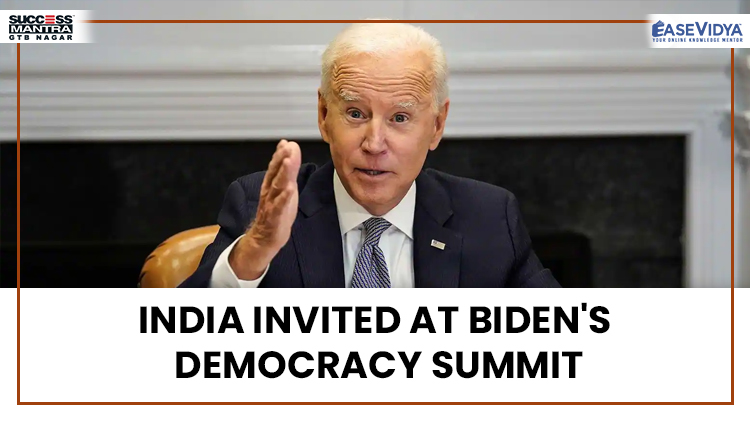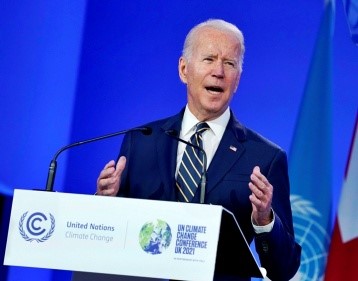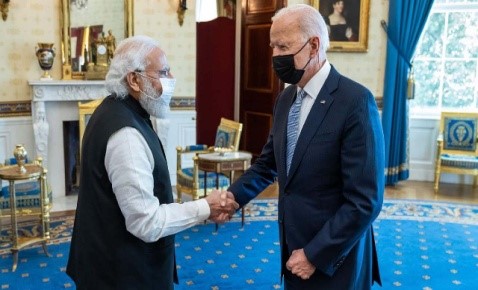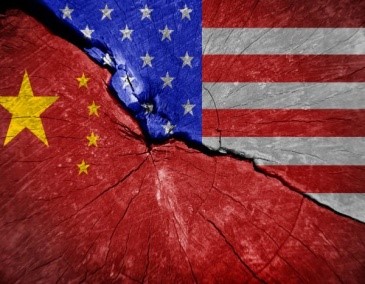
INDIA INVITED AT BIDEN'S DEMOCRACY SUMMIT
INDIA INVITED AT BIDEN'S DEMOCRACY SUMMIT
The President of the United States Joe Biden has invited more than 100 countries to a virtual summit on democracy to be held on December 9-10, 2021. The invite list of the democracy summit includes India and Taiwan but excludes China, a move which is bound to anger the country. The virtual democracy summit was a campaign pledge by the US President, who placed the struggle between the democracies and the autocratic governments at the heart of his foreign policy. The Summit for Democracy will be taking place ahead of an in-person meeting at its second edition in 2022. The main rivals of the United States- Russia and China- have been excluded from the list, however, the inclusion of Taiwan is guaranteed to further escalate the tensions between US and China. It is widely known that China resists any use of the word ‘Taiwan’ as it lends a sense of international legitimacy to the democratic self-ruled island, which China claims as part of its territory and has also vowed to seize one day. The final list leaves out Russia, while in the South Asia region Afghanistan, Bangladesh, Sri Lanka have been excluded.

Current Affairs Notes By Success Mantra Coaching Institute GTB Nagar Delhi CLICK HERE
DEMOCRACY SUMMIT: WHO IS INVITED
To a virtual summit on democracy, including the major western alliances, the US has invited India and Pakistan from the South Asia region. From East Asia, Japan is invited to the summit. Taiwan is invited to the virtual summit on democracy. A major diplomatic move that will further escalate the tensions between US and China. Among the Middle East countries, only Iraq and Israel have been invited to the summit on Democracy. Brazil is invited even though Jair Bolsonaro, Brazil’s far-right President has been criticized as having an authoritarian bent. He was also a firm supporter of Donald Trump. Poland has been invited to the summit despite the continuous tension with the EU over its human rights record. In Africa, South Africa, the Democratic Republic of Congo, Niger, and Nigeria are invited to the Biden Democracy Summit.

WHO IS NOT INVITED?
China and Russia, the principal rivals of the United States are not invited to the Democracy Summit. Turkey is missing from the participant’s list. The country is also the US’s NATO ally. Traditional Arab allies of the United States- Saudi Arabia, Egypt, Jordan, Qatar, and the United Arab Emirates, are not on the democracy summit invite list. As per the list posted on the US State Department website, Afghanistan, Bangladesh, and Sri Lanka are excluded from the summit. Hungary is not invited. The country is led by the hardline nationalist Prime Minister Viktor Orban.
Three principal themes at democracy summit
While announcing the Democracy Summit back in August 2021, the US had said that the meeting on democracy will stimulate the initiatives and commitments across three principal themes:
- Defending against authoritarianism
- Fighting Corruption
- Promoting Respect for Human Rights
A Virtual Summit on Democracy is being organized by the United States as democracy has suffered major setbacks in the nations where the country had placed great hopes. Myanmar and Sudan have experienced military coups. Taliban has taken over Afghanistan after the withdrawal of US troops and Ethiopia is in the midst of a conflict that can lead to its implosion.
WHAT THE SUMMIT AIMS TO ACHIEVE?
According to a website of the White House in the US, the summit aims to discuss the several threats democracies across the world are facing and address these with “collective action”. “The summit will focus on challenges and opportunities facing democracies and will provide a platform for leaders to announce both individual and collective commitments, reforms, and initiatives to defend democracy and human rights at home and abroad,”. During the summit, participating leaders will also be encouraged to announce meaningful steps that will help move towards the goals of strengthening democracy across the world.
WHY CHINA ISN'T INVITED?
The United States and China has not seen eye to eye on several things and the US has made efforts to curb China’s growing influence in south-east Asia. Even during the meet between Biden and his counterpart Xi Jinping recently, the two countries locked horns over Taiwan. Chinese state media reported that Biden was cautioned by Xi that getting involved with Taiwan would be like “playing with fire”. Xinhua news agency quoted Xi as saying, “Some people in the US intend to 'use Taiwan to control China.' This trend is very dangerous and is like playing with fire, and those who play with fire will get burned.” Not just Taiwan, China criticised the Quad summit held by Biden in September this year, in which India was also a participant. Chinese Foreign Ministry spokesman Zhao Lijian had told a media briefing that cooperation between the countries should not target third parties. "It is China's consistent belief that any regional cooperation mechanism should follow the trend of peace and development, and help promote mutual trust and cooperation among regional countries rather than target a third party or undermine its interests,” Zhao had said.

GLOBAL STATE OF DEMOCRACY REPORT, 2021
According to the recently released Global State of Democracy Report, 2021, the number of countries moving towards authoritarianism in 2020 was higher than that of countries becoming more democratic. The report aims to influence the global debate and analyses current trends and challenges to democracy, exacerbated by the Covid-19 pandemic. It offers specific policy recommendations to spark new and innovative thinking for policymakers, governments and civil society organizations supporting democracy. It is released by the International Institute for Democracy and Electoral Assistance (International-IDEA).
About International Institute for Democracy and Electoral Assistance:
International IDEA is an intergovernmental organization that supports sustainable democracy worldwide. It was founded in 1995 and currently has 33 member states. International IDEA advances democracy worldwide, as a universal human aspiration and an enabler of sustainable development, through support to the building, strengthening and safeguarding of democratic political institutions and processes at all levels.
HIGHLIGHTS OF THE REPORT
- Democratic Decline: Democratically elected Governments, including established democracies, are increasingly adopting authoritarian tactics.
- Effect of Pandemic: The pandemic placed considerable stress on democracy across the region by imposing inevitable restrictions on movement and—where governments were sensitive to criticism —also restrictions on freedom of expression. The year 2020 was the worst on record, in terms of the number of countries affected by deepening autocratisation. The pandemic has thus had a particularly damaging effect on non-democratic countries, further closing their already reduced civic space.
- Popular Support: This democratic backsliding has often enjoyed significant popular support.
- Indian Scenario: The report highlighted the case of Brazil and India as “some of the most worrying examples of backsliding. However, India remained in the category of a mid-level performing democracy as it has since 2000.
PRAVAHINI Current Affairs Notes By Success Mantra Coaching Institute GTB Nagar Delhi CLICK HERE
TEST YOURSELF
Q.1 Which of the following has invited India in the summit on democracy to be held in December?
- Japan's PM Fumio Kishida
- Canada's PM Justin Trudeau
- US President Joe Biden: ANSWER
- None of the following
Q.2 Which of the following who are also the main rivals of the United States of America are invited to the Democracy Summit to be held recently?
- China & Russia: ANSWER
- Turkey & Saudi Arabia
- Syria & North Korea
- None of the following
Q.3 There are three principles on which the democracy summit is based. Which of the following is not one of them?
- Defending against authoritarianism
- Fighting Corruption
- Promoting Respect for Human Rights
- I & II follows
- II & III follows
- I, II & III follows
- None of the following: ANSWER
Q.4 The United States of America as part of which of the following legislation, required to assist Taiwan if coerced or attacked by China?
- Taiwan Relations Act, 1979: ANSWER
- Taiwan's Security Act, 1981
- Taiwan Sovereign state Act, 1979
- None of the following
Q.5 Consider the given statements & state which of the following is/are correct in the reference to the Group of Seven (G-7) nations?
- It is an intergovernmental organisation that was formed in 1995 & meets annually to discuss issues of common interest like global economic governance, international security and energy policy.
- The Group of Seven (G-7) countries includes the United Kingdom, China, India, Germany, Italy, Japan and the US.
- Only I follows
- Only II follows
- Both I & II follows
- None of the above: ANSWER












jipdblvmtf
Muchas gracias. ?Como puedo iniciar sesion?